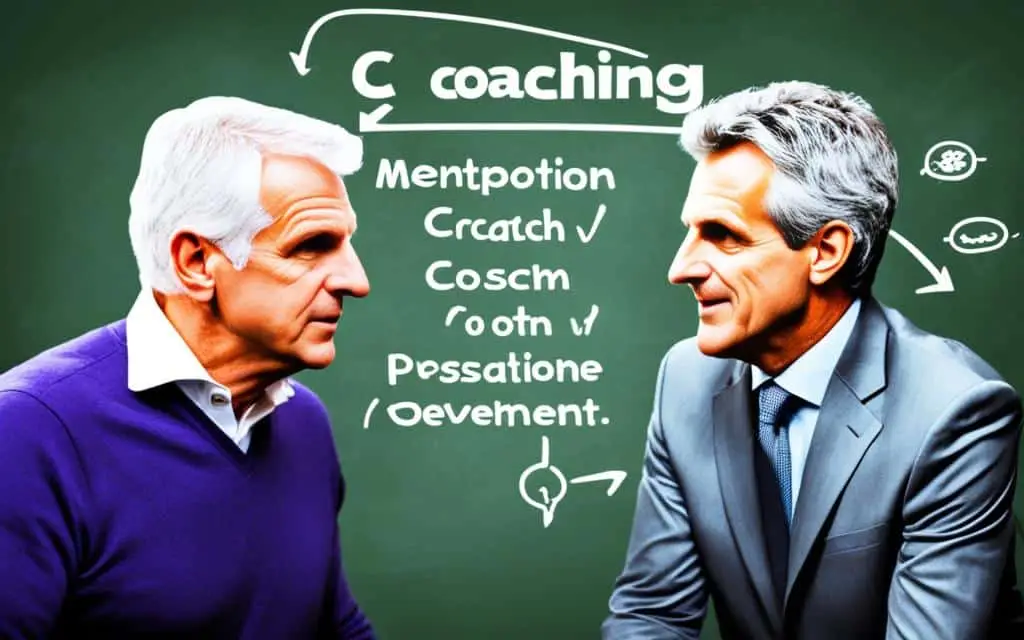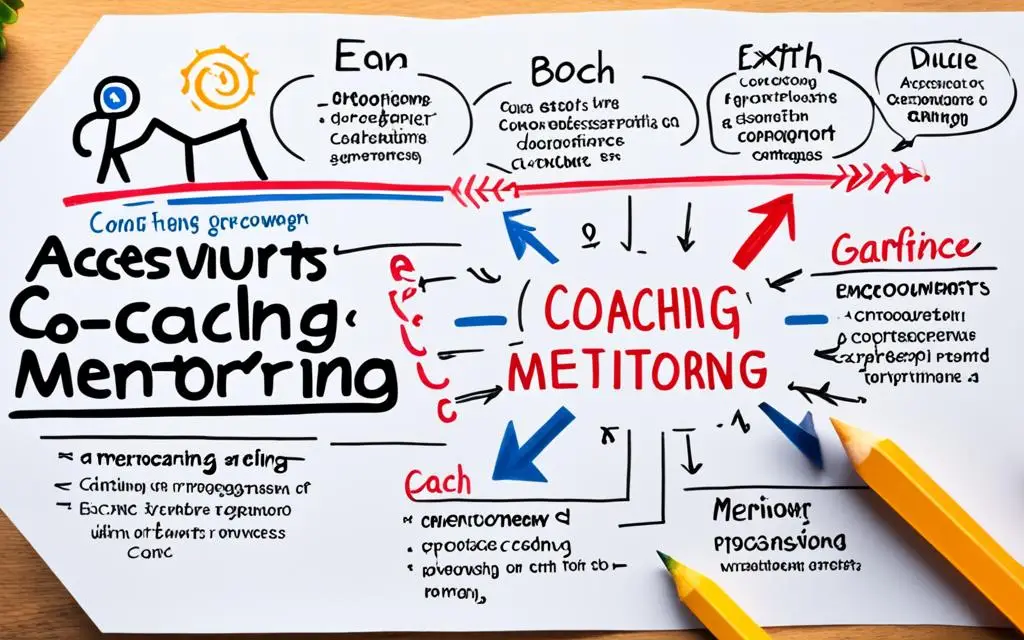Have you ever found yourself at a crossroads, unsure of which path to take? In the pursuit of personal and professional growth, it’s natural to seek guidance and support. In these moments, we often find ourselves torn between coaching vs mentoring, two powerful approaches that can propel us forward.
Coaching and mentoring have the potential to transform our lives, but understanding their differences is crucial in making the right choice for our individual journeys. Let’s delve into the difference between coaching and mentoring, unraveling their distinct qualities and benefits along the way.
Key Takeaways:
- Coaching and mentoring are distinct approaches to personal and professional development.
- Understanding the differences between coaching and mentoring helps in making informed decisions.
- Coaching focuses on guidance and support, while mentoring emphasizes long-term development relationships.
- Both coaching and mentoring have valuable benefits in various aspects of life.
- By the end of this article, you’ll be equipped with the knowledge to choose the right path for your growth.
Understanding the Basics: Coaching and Mentoring Definitions
What are the coaching and mentoring definitions? Coaching and mentoring are two distinct approaches to personal and professional development. To fully grasp their differences (coaching vs mentoring), it is essential to understand their definitions and core principles.
Coaching and mentoring explained
Coaching is a collaborative process where a coach provides guidance and support to help a client achieve their goals and reach their full potential. It is a non-directive approach that focuses on asking the right questions and empowering the client to find their own solutions. The coach acts as a facilitator, helping the client gain self-awareness, overcome obstacles, and take action toward their desired outcomes.
Mentoring, on the other hand, is a relationship-based approach where a mentor, who is usually an experienced individual in a particular field, provides guidance, advice, and support to a mentee. The mentor shares their knowledge, expertise, and personal experiences to help the mentee develop their skills and knowledge. Unlike coaching, mentoring involves a more directive approach, where the mentor guides the mentee by offering insights, recommendations, and key learnings.
Both have their unique benefits and applications (coaching vs mentoring similarities). While coaching focuses on empowering individuals to find their own solutions, mentoring offers valuable guidance based on the mentor’s expertise and experiences. By understanding the definitions of coaching and mentoring, you can better navigate the different paths available for personal and professional growth.
Coaching vs Mentoring Differences Highlighted
When doing coaching vs mentoring comparison, it’s important to recognize the key differences that set them apart. These differences encompass various aspects, including the duration of the relationship, the approach taken by the coach or mentor, the need for formal training and qualifications, the structural disparities in practice, and the distinct focus on development or performance.
| Aspect | Coaching | Mentoring |
|---|---|---|
| Duration of Relationship | Typically short and defined period | Long-term, ongoing relationship |
| Approach | Non-directive, asking empowering questions | Directive, offering guidance and advice |
| Formal Training | No specific requirements, although training is common | Informal or formal training may be necessary |
| Practice Structure | Task-oriented, goal-driven sessions | Flexible, personalized, and relationship-focused |
| Focus | Performance improvement, skill development | Personal growth, knowledge transfer |
Understanding these differences is crucial in order to make informed decisions about whether coaching or mentoring suits your specific needs and objectives. By examining the contrasts in duration, approach, training, structure, and focus, you can determine which path aligns better with your personal and professional aspirations.

Coaching vs Mentoring: Skill Sets and Techniques
Both coaching and mentoring require specific skill sets and techniques to be effective. In coaching, the coach needs skills in active listening, asking powerful questions, providing feedback, and goal-setting. They should also have a good understanding of human behavior and be able to create a supportive and trusting environment.
“A good coach has the ability to listen deeply, not only to what is being said but also to what is left unsaid. They know how to ask the right questions that will challenge and provoke thought, helping the client gain new insights and perspectives.”
Mentoring, on the other hand, involves the mentor sharing their knowledge, experience, and expertise with the mentee. The mentor should possess excellent communication and relationship-building skills. They must be able to provide guidance and offer advice based on their own personal and professional experiences.
Overall, both coaching vs mentoring require a combination of technical skills, such as active listening and asking questions, as well as interpersonal skills like empathy and trust-building. It is the mastery of these skills and techniques that allows coaches and mentors to effectively support and guide individuals in their personal and professional development.
| Coaching | Mentoring |
|---|---|
| Active listening | Sharing knowledge and experience |
| Asking powerful questions | Offering advice and guidance |
| Providing feedback | Building relationships |
| Goal-setting | Empathy and trust-building |

Benefits of Integrating Coaching and Mentoring into the Workplace
Coaching vs mentoring in the workplace? Integrating them into the workplace can have numerous benefits for both individuals and organizations. By leveraging the power of coaching and mentoring, employees can unlock their full potential, while organizations can foster a culture of continuous learning and development. Let’s explore some of the key benefits of integrating coaching and mentoring in the workplace:
- Enhanced Learning and Personal Growth: Coaching and mentoring provide employees with personalized guidance and support, allowing them to acquire new knowledge, skills, and perspectives. Through coaching, individuals can set and achieve meaningful goals, while mentoring offers valuable insights and advice based on the mentor’s experience and expertise.
- Increased Employee Engagement and Retention: Coaching and mentoring create a sense of belonging and investment within employees. By providing ongoing support and development opportunities, organizations can foster higher levels of engagement and commitment, leading to increased job satisfaction and employee retention.
- Leadership and Organizational Advantages: When coaching and mentoring are integrated into the workplace, they contribute to the development of strong leaders. Coaching helps individuals develop essential leadership skills, such as effective communication, problem-solving, and decision-making. Mentoring, on the other hand, offers aspiring leaders the guidance and support they need to navigate their professional journey and make informed career choices.

“The world’s most successful people have coaches and mentors guiding them along their journey. Integrating coaching and mentoring in the workplace ensures that every employee has access to the support and guidance they need to thrive.”
By combining coaching and mentoring, organizations can create a holistic approach to employee development, nurturing their talent from multiple angles. This integrated approach fosters a growth mindset and encourages continuous learning, ultimately driving individual and organizational success.
Stay tuned for the next section where we’ll provide a summary and conclusion of our exploration into coaching vs mentoring.
Conclusion
Coaching and mentoring offer unique paths for personal and professional development. By understanding the differences between the two, you can make informed decisions about which approach aligns with your goals and aspirations.
When choosing the right path for personal and professional development, consider the level of guidance and support you need. Coaching provides a non-directive approach, empowering you to find your own solutions through introspection and self-discovery. On the other hand, mentoring involves a more guidance-oriented approach, with a mentor providing advice and sharing their experiences.
Both coaching and mentoring have their place within organizations. By leveraging coaching, individuals can enhance their learning and personal growth. Coaching can also help organizations foster employee engagement and retention, as well as develop strong leadership. Mentoring, on the other hand, allows for the transfer of knowledge and expertise, supporting career development and promoting a culture of learning and growth.
In conclusion, whether you choose coaching vs mentoring, or a combination of both, the key is to invest in your personal and professional development. By leveraging coaching and mentoring in organizations, individuals and businesses can unlock their full potential, leading to enhanced performance, growth, and success.
FAQ
What is the difference between coaching and mentoring?
Coaching is a non-directive approach where a coach helps a client achieve their goals and find their own solutions. Mentoring, on the other hand, involves a more experienced individual providing guidance and advice to a less experienced person (coaching vs mentoring).
How long does a coaching or mentoring relationship typically last?
The duration of a coaching relationship can vary based on the client’s goals and needs, ranging from a few sessions to several months. In contrast, mentoring relationships often last longer, sometimes continuing for years, as the mentor supports the mentee’s ongoing development.
Is formal training or qualifications required to become a coach or mentor?
While formal training and qualifications are not mandatory for coaches and mentors, they can enhance their skills and credibility. Many coaches choose to pursue certifications or complete coaching programs, while mentors often draw from their own experience and expertise in a specific field.
What are the key techniques used in coaching?
Coaches use various techniques, such as active listening, asking powerful questions, providing feedback, and goal-setting, to support clients in their personal and professional growth. These techniques help clients gain clarity, overcome obstacles, and develop actionable plans.
What are the benefits of integrating coaching and mentoring in the workplace?
Integrating coaching and mentoring programs in the workplace can lead to enhanced learning and personal growth for employees. It can also increase employee engagement and retention, cultivate leadership skills, and provide organizational advantages, such as improved performance and talent development.










